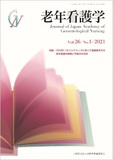Japanese
English
- 販売していません
- Abstract 文献概要
- 参考文献 Reference
抄録
本研究は,エスノグラフィの手法を用いて,看護師が日常行っているせん妄リスクのある患者への看護実践を記述し,そこからせん妄ケアの核となる文化的テーマを特定することを目的とした.
研究参加者である一般病院2施設の看護師9人を対象として,せん妄リスクのある患者への看護実践場面を参加観察し,その後,半構造化インタビューを行った.参加観察のフィールドノートおよびインタビューの逐語録をSpradleyの分析手法に則り分析した.
分析の結果,せん妄リスクのある患者への看護実践として7つの要素が特定され,構造化された.せん妄ケアの看護実践を統合する文化的テーマは「患者にとってストレスになるものを予測し,安楽にすごせるようにする」であった.
本研究で特定されたせん妄ケアの構造と文化的テーマから,患者を個別性のある全人的な存在としてとらえ,入院治療環境における患者のストレスや基本的ニードをアセスメントし,患者との相互作用を基盤にしながら安楽の増進に向けて援助することが,せん妄ケアの本質として重要である可能性が示唆された.
The aim of this study was to describe practical nursing knowledge about patients with the risk of delirium that is applied regularly by a cultural group of nurses, and to identify cultural themes that serve as the basis for delirium care, using ethnographic methods.
The study participants were nine nurses working in two general hospitals. Participant observation of practical nursing for patients with the risk of delirium was performed, after which semi-structured interviews were conducted. Verbatim records of the participant observation field notes and interviews were analyzed with the Spradley's framework for ethnographic data analysis.
From the results of the analysis, seven elements were identified and structured as nursing practices for patients with the risk of delirium. A cultural theme that synthesized nursing practices for delirium care was “to predict things that are stressful for patients and help them to spend their time comfortably.”
The present findings suggest the possibility that, based on the delirium care structure and cultural themes identified in this study, perceiving patients as individual, holistic human beings, assessing patients' stress and basic needs in the hospital treatment environment, and providing assistance to promote comfort based on interactions with patients are important as essential qualities of delirium care.
Copyright © 2021, Japan Academy of Gerontological Nursing All rights reserved.


